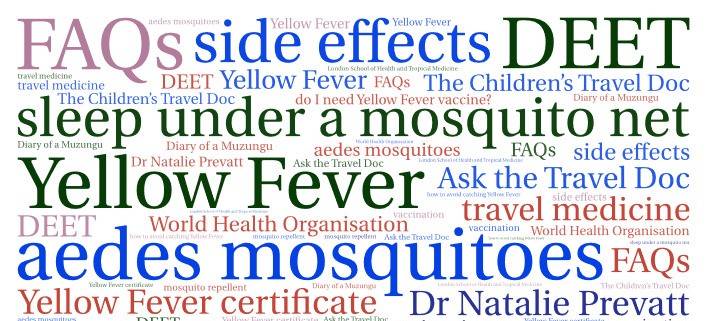
Ask the Travel Doc: what are our chances of getting Yellow Fever on holiday in Uganda?
In summary: the risk is “negligible” but you still need to have proof of having had the Yellow Fever vaccine in order to enter the country.
The “Ask the Travel Doc” series is designed to answer some of your frequently asked medical questions (FAQs) about travel to East Africa. The FAQs are some of the many enquiries I’ve received here on Diary of a Muzungu over the years.

I am advised by Dr Natalie Prevatt, a British Travel Medicine doctor who I became friends with when she worked here in Uganda. Dr Prevatt (M.B.B.C.H., M.R.C.P.C.H., D.T.M.H., D.P.I.D. C.T.H.) is a Paediatric Consultant certified in Infectious Diseases, Tropical and Travel Medicine. She chairs The International Society of Travel Medicine’s paediatric board. Although she specialises in the needs of travelling pregnant women and children, she is a treasure trove of info on tropical diseases. She’s given me tons of helpful advice over the years, from mosquito and tsetse bite prevention, to how to travel with an upset stomach. She’s recently launched The Children’s Travel Doc telephone service preparing people for travel so she can be on the end of the phone for you too – I just hope she’ll still have time for me
Over to you, Travel Doc!
Frequently asked questions about Yellow Fever and travel to Uganda courtesy of the “Ask the Travel Doc” series.
What are the chances of getting Yellow Fever in Uganda?
Dr Prevatt advises: Yellow Fever is present in sub-Saharan Africa, South America and Trinidad.
The chance of getting Yellow Fever in Uganda is negligible. There was one confirmed case in Wakiso District in 2022, according to WHO. There may be other unconfirmed cases.
Note that you can’t enter the country without proof of vaccination. If you are an international visitor, you’ll need to upload a digital copy of your Yellow Fever vaccination certificate as part of the online application for your tourist visa. Ugandans (and others who do not need a tourist visa) may be asked to show their certificates too, whether at road borders or Entebbe Airport.
Regionally, the chance of spread from neighbouring countries into Uganda does exist, but at the date of publishing this post it’s very rare.
How do you get Yellow Fever?
Dr Prevatt advises: You can catch Yellow Fever when you are bitten by aedes mosquitoes (the “stripey ones”) that are infected with the Yellow Fever virus. Aedes mosquitoes bite mostly in the day (but also sometimes at night).
How to avoid catching Yellow Fever?
Dr Prevatt advises: If you are concerned about getting bitten in daytime, wear long sleeves and socks and use a good mosquito repellent (i.e. DEET. I could talk about repellents for hours!) and respray regularly, especially after swimming. Do not put repellent under suntan lotion as it needs to be evaporating off the top of your skin!
After dusk, use more repellent and always sleep under a mosquito net. Babies will need cot nets and carrier or pram nets. Wearing long pyjamas with the air conditioning or fan on (if you have that option) is also very useful. You may also choose to use a mosquito coil or plug in but many people don’t like them. The Yellow Fever vaccine is also good protection but the bite prevention techniques are good as they work for all mosquitoes.
What are the symptoms of Yellow Fever?
Dr Prevatt advises: Yellow Fever can be a flu-like illness with a bit of nausea and vomiting, and sometimes yellowing of skin and eyes called jaundice (hence the name Yellow Fever) or it can be a severe haemorrhagic (bleeding) disease that causes failure of the circulation.
There are approximately 380,000 cases of Yellow Fever worldwide each year. Out of these, there are around 180,000 reported deaths. That’s quite a high mortality rate, so it is a dangerous disease.
How do you treat Yellow Fever?
Dr Prevatt advises: If you get jaundice you should go straight to hospital. Like many other viruses, there is no cure for Yellow Fever. In most cases (unless you get jaundice) it’s recommended that you simply get supportive nursing care until the virus passes.
Who needs Yellow Fever vaccination?
Dr Prevatt advises: Very few travellers catch Yellow Fever. Most people who get infected live in the region where Yellow Fever is spread.
Everyone travelling to Uganda is required to have certified protection against Yellow Fever, or a certificate of exemption. This applies to babies over age 9 months, or over 6 months if there was an epidemic (there are few reasons to take a baby into an epidemic!) By insisting on vaccination, Uganda are protecting themselves from people spreading the disease.
When you apply for a Uganda tourist visa for instance, you are asked to upload evidence of your Yellow Fever vaccination. This little yellow card is called the international certificate of vaccination.
People with weak immune systems (for example on low dose steroids, chemotherapy, pregnant, or at extremes of age) can have serious side effects from the Yellow Fever vaccine. They will be offered an exemption certificate, instead of the vaccine, when they see a Travel Health Specialist. Sometimes however, those people can have the vaccine if they cannot avoid travel to a Yellow Fever zone.
Once you have had the Yellow Fever vaccine, you will be issued with your yellow international certificate of vaccination card to show that you’ve had it. This card should be signed and dated by the clinic, with a log of your vaccination number. This certificate now lasts for life.
Tell us about possible side effects of theYellow Fever vaccine?
Dr Prevatt advises: Yes, most definitely! The Yellow Fever vaccine is a live virus vaccine which can cause serious adverse events. Its use is restricted to certified providers who have had training in deciding whether the vaccine is appropriate for you.
For example, very rarely having the vaccine can cause a disease similar to Yellow Fever itself. The risk of this appears to be approximately 1 in 200,000 people vaccinated. This risk is higher in people aged over 60, and very high in babies under 6 months (includes if a breastfeeding mother is given the Yellow Fever vaccine). More commonly, people can develop neurological problems after the vaccine; but the risk of this is still less than 1 per 100,000 people vaccinated.
A certified Travel Medicine Clinic will therefore assess your risk of catching the disease (remember Yellow Fever is nasty) and balance it against the risks of the vaccine.
Side effects are a different thing, and they usually amount to a very sore arm, with body aches and headache in one third of people.
Is it true that people in their 60s don’t need to have the Yellow Fever vaccination?
Dr Prevatt advises: No. It’s not that older people don’t need the Yellow Fever vaccination! Only that the risk of serious adverse events are higher for over 60s and at that age, the risk of the Yellow Fever vaccine itself usually outweighs the risk of the disease.
In such cases, you need to think carefully: if you need the certificate to enter a country where there is no Yellow Fever (but a certificate requirement) that is one reason to get an exemption certificate… if there’s a high risk of catching Yellow Fever and you haven’t been vaccinated, consider whether you really want to get an exemption certificate and travel there unprotected?!
Top tip: If you plan to travel somewhere when you are over 60 years old, think about having the vaccine earlier!
There are other groups of people who shouldn’t have the vaccine too, such as those living with HIV and with CD4 count of under 200. Your Travel Clinic will tell you if you shouldn’t have the Yellow Fever vaccination. In these cases, if you choose to travel you will be issued with a medical letter of exemption (MLOE). This is like the yellow card and explains why you haven’t been given the vaccine. If your immunity problem is your HIV status, you can ask that HIV not be mentioned on the yellow card and I would recommend they just write ‘medical exemption confirmed’.
What if you have lost your Yellow Fever certificate?
Dr Prevatt advises: If you’ve lost your certificate – um, don’t lose your certificate! – you will need to take a picture or copy of it to a Yellow Fever vaccination centre. They can then issue you with a new certificate. If you don’t have any evidence, then you’ll need to contact the centre that gave you the vaccine. They should be able to issue a new Yellow Fever certificate, once they have checked their records.
How many times in your life should you have a Yellow Fever vaccination?
Dr Prevatt advises: It’s only necessary to have the Yellow Fever vaccination once. In 2016 the World Health Organisation (WHO) announced that most people only need one dose to retain lifelong immunity.

You may have had more than one Yellow Fever vaccine and that’s not a problem, because it used to be given at 10-year intervals. However, nowadays, if you have had the vaccine and you have proof – you don’t need to have it again.
Top tip: WHO still recommends a second dose for those who had a weakened immune system at the time of their initial dose, including if you had it when pregnant or under 2 years of age.
What is the process for avoiding having a repeat Yellow Fever jab at the airport?
Dr Prevatt advises: Any border control that insists on seeing evidence of Yellow Fever vaccine within the last 10 years (old rules) and if not wanting to give you another dose – should be reminded of WHO’s revised rule that you only need one dose in your lifetime. If you find yourself in this situation, ask to speak to someone senior and explain that you do not need to be ‘jabbed’ again because your certificate is valid for life (even if it states a booster is due in 10 years).

Why the “Ask the Travel Doc” series?
My name is Charlotte Beauvoisin and I’ve lived in Uganda since 2009 when I arrived as a professional volunteer with Voluntary Service Overseas. Before touching down in Uganda, I was given a series of 14 injections (as it was thought to be cheaper to inoculate me than to expatriate me!) Since then I’ve shared numerous personal stories about travel health in Uganda. VSO volunteer friends included doctors, midwives and pharmacists, and tropical medicine experts such as Dr Natalie Prevatt, who also arrived in Uganda in 2009. She has been a regular visitor to Uganda every year (bar the pandemic), working in Mulago, Soroti, Mbale and Lacor Hospital. She has lectured annually in East Africa and back home in London where she was the first Travel Fellow of the London School of Health and Tropical Medicine to concentrate on the needs of pregnant women and children travelling. (As well as being an expert, our Travel Doc is a mum).




























Hope you are doing well! Appreciate the information about yellow fever. My wife and I are traveling to Uganda for 16? days. We are both exempt from the yf vaccination. Would it be helpful and wise to avoid certain areas of Uganda that may be high risk for yellow fever? If so, what are those areas will be traveling in a few weeks? Thank you much!
Hi Phil
Glad to hear you are finding my blog useful
I have only ever met one person in Uganda who said he had yellow fever and I’ve lived here 16 years. I have rarely heard anyone talk about there being a risk here.
That said, the government did have a free vaccination campaign in 2024 so I suppose a few people must have caught it. How and where, I can’t tell you.
As you will see from this blog post, yellow fever was not being recorded in WHO stats (so cases were extremely rare or disputed).
Yellow fever is carried by mosquitoes. To avoid mosquito bites, repellents are most important. We always sleep under mosquito nets too.
I shared your question with Dr Prevatt, author of this blog post. She says you are welcome to consult with her, as medics can potentially access maps that would show where yellow fever might occur.
I hope this is of some help.
If you need any travel advice or ideas, feel free to ask.
Enjoy the Pearl of Africa!